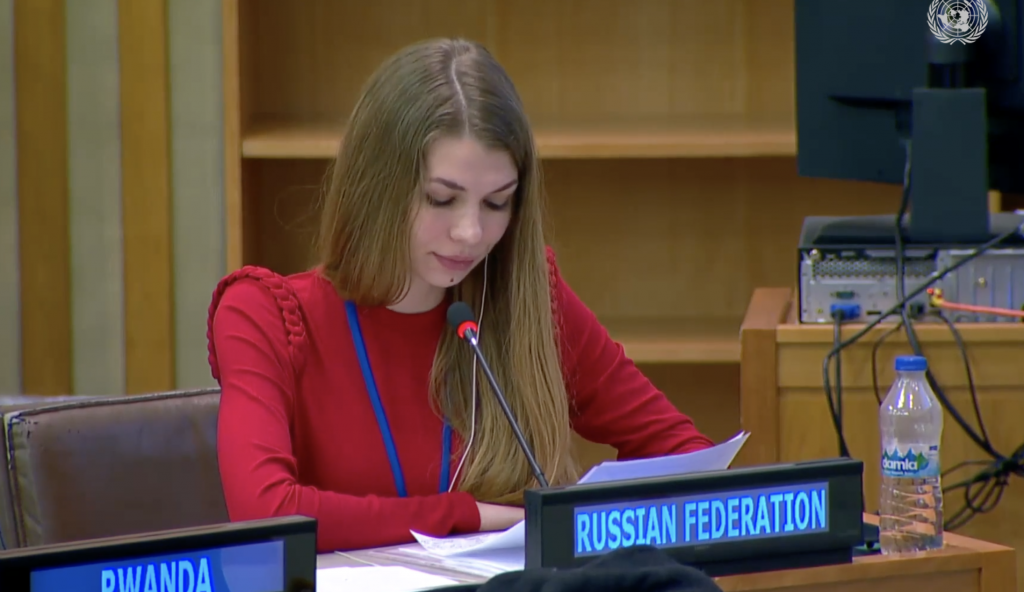Statement by Representative of the Russian Federation Ms.Irina Tyazhlova at the Sixth session of the UN Open-Ended Working Group on security of and in the use of ICTs 2021-2025 under agenda item "Application of International Law to the Use of ICTs by States"
Mr. Chair,
International legal regulation of information space is one of the most important and at the same time complex aspects of the mandate of the Open-ended Working Group (OEWG). In 25 years of discussions on this matter under the UN auspices the world community has reached consensus only regarding the applicability of generally accepted principles of international law to the ICT field. These include, primarily, sovereign equality, non-use of force and threat of force, respect for the territorial integrity of States, resolution of international disputes by peaceful means, non-interference in internal affairs, fulfillment in good faith of obligations under international law and interstate cooperation.
At the same time, the application even of these principles in the field of ICTs should not be carried out automatically due to the legal and technical specifics of the information environment. This relates, in particular, to such features as the cross-border and pervasive nature of ICTs, the anonymity and of their use, and their possible use for dual purposes. What should a State do in a situation when the information infrastructure located on its territory and used to carry out computer attacks belongs to a foreign company? How to ensure the sovereignty of a State in its information space, in conditions when global communication networks are under the control of individual countries? How, in such circumstances, can we guarantee compliance with the UN Charter and the principles of international law concerning the sovereign equality of States and non-interference in their internal affairs?
This is just a number of questions that need to be answered to exclude the so called political attribution of computer attacks from international relations. Another important aspect of this discussion is the problem of reliable identification of the source of harmful activities. It is necessary to adhere to the principle enshrined in the UN General Assembly resolution No.73/27 and in the reports of the Groups of Governmental Experts in 2015 and 2021: all accusations of organizing and committing illegal acts brought against States should be substantiated. It is unacceptable to assign responsibility for incidents in information space to anyone without evidence, and, even more so, to introduce unilateral restrictions at one’s own discretion. It is necessary to agree on organizational and technical de-anonymization mechanisms that will enable objective identification of the sources of computer attacks and of the dissemination of illegal information.
It is obvious that there are many gaps in international law with regard to information space. In this respect, we believe that the point repeated by a number of States about the sufficiency and full applicability of the current international law for regulating the digital environment is completely groundless. This is precisely the conclusion that was voiced at a recent seminar organized by the United Nations Institute for Disarmament Research (UNIDIR). Without disclosing the details of the event – it was held under the Chatham House rules – I will only say that the consideration of specific scenarios has clearly demonstrated that it is impossible to comprehensively regulate information space on the basis of the existing norms.
The only way to fill the gaps in international law is to develop it progressively through the elaboration of new norms which would take into account the specifics of ICTs. The best option is to work towards agreeing upon a universal legally binding instrument. In our opinion, this is the only way to ensure the exclusively peaceful use of ICTs and the prevention of conflicts in this area. In the absence of relevant international legal obligations, States cannot be held accountable for wrongful acts.
Russia, together with a group of countries, presented a concept of a UN convention on ensuring international information security as a prototype of a future international treaty. We dwelled upon it in detail within the discussion on rules, norms and principles of behavior of States. The document was published at the OEWG website and is open for discussion.
Thank you for attention.
